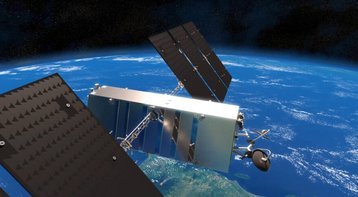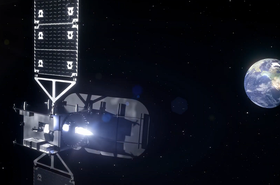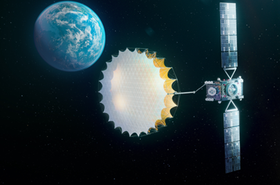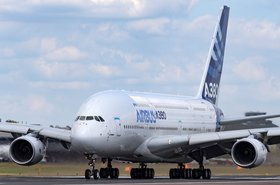Melbourne-based digital infrastructure provider Vocus has announced it will be building and operating Telesat Lightspeed’s first low-Earth orbit (LEO) landing station in New South Wales, Australia, providing fiber connectivity to integrate Lightspeed’s systems to terrestrial networks.
This long-term agreement included Telesat Lightspeed MEF 3.0 compliant carrier ethernet services for Vocus’ enterprise and government customers once they become operational, adding to its existing LEO satellite services customer base.
“Telesat Lightspeed was designed to telco-based standards to enable seamless integration and interoperability with terrestrial networks,” Asit Tandon, chief network and information officer at Telesat, told DCD. “Service providers, like Vocus, can define, configure, manage and monitor services to their end users, without having to contact Telesat. Additionally, they have public and private interconnect options which give them multiple secure options for their different market segments.”
Ottawa-based Telesat is a leading satellite operator has long highlighted its capacity to enable sovereign and secure connectivity, emphasising its terminal-to-terminal direct connectivity, enabling secure terrestrial links for sensitive, mission-critical information through optical laser-linked speeds while de-centralizing control to users.
“Telecom, enterprise, aviation, maritime and defence connectivity are all considered mission-critical networks in Australia and across the world,” Tandon told DCD. “By designing Telesat Lightspeed with MEF standards-based Layer 2 architecture, telecom carriers, enterprise customers and governments can all benefit.”
New South Wales has been a hub for Australian space and satellite investment for years now, though developments in infrastructure like these have the power to translate the region’s technological victories into local economic growth.
“Vocus already has 30 ground stations currently in operation or contracted to be built, demonstrating that our infrastructure provides the critical reliability needed for LEO networks,” Ashley Neale, head of Vocus’ space and wireless operations said in a statement.
A more secure standard?
With cyber interference becoming an ever-present facet of business news, connectivity players can no longer afford to be short-termist about the ever-accelerating pace of cyber aggression, not least in the satellite market in which networks are complex and distributed.
“Many satellites in operation today were launched years ago and may not have been designed with modern cybersecurity measures in mind,” Tandon told DCD. “Cyber-attacks, even in this decade, have shown that even terrestrial infrastructure can be compromised. The satellite industry and governments are continually sharing threat data and mitigation strategies to ensure all operators maintain a strong security posture. Telesat’s structured approach is a zero-trust architecture across all infrastructure, user terminals, and users accessing the network, with standards compliance, vulnerability assessments, penetration tests, and third-party attestation under globally recognized cybersecurity frameworks.”
When asked what set Lightspeed apart from big tech offerings like Starlink and Kuiper, who are bullish on expanding their government and enterprise market share, Tandon told DCD; “Telesat Lightspeed was designed from inception to meet the security and resiliency requirements of enterprise, telecom, aviation, maritime, government and defense customers.”
Telesat will begin launching its Lightspeed LEO satellites in late 2026. The company announced its entrance into low-Earth space back in 2016; when completed, it’s due to comprise 198 satellites in polar and inclined orbits. The company has signed Lightspeed deals with the likes of Arabsat, Orange, and Viasat.
“We’re making strong progress across the development of our LEO satellites, landing stations, user terminals, and software development,” Tandon told DCD. “We have strong engagement across our telecom, enterprise, aviation, maritime, and government customers and prospects, and we believe we’ll have more great announcements to share in the coming months.”
Read the orginal article: https://www.datacenterdynamics.com/en/news/telesat-announces-multi-year-contract-with-vocus-for-telesat-lightspeed-services/









